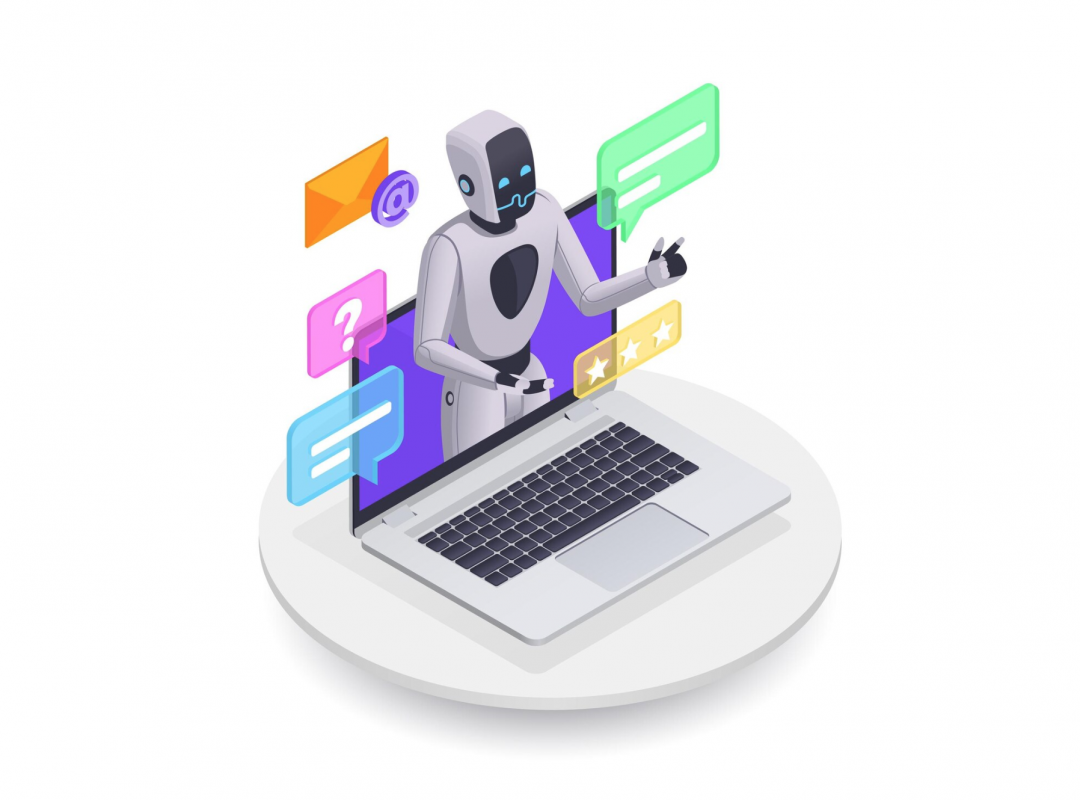
Artificial Intelligence for the Success of Your Online Project
- Published : Thu, Nov 2, 2023 3:48 PM
- Updated : Fri, Nov 17, 2023 10:49 AM
- Category : Artificial Intelligence (AI)
Artificial Intelligence (AI) has become a driving force in the digital world, revolutionizing the way businesses operate online. In this article, we will explore how AI can enhance the success of your online project. We'll delve into the concept of AI, its role in online businesses, the benefits of its implementation, challenges, practical execution, case studies, and future trends.
Part 1: Understanding Artificial Intelligence
AI is a branch of computer science that aims to create intelligent machines capable of simulating human-like cognitive functions, such as learning and problem-solving. These machines process large volumes of data, identify patterns, and make decisions based on the information they acquire. AI technologies include machine learning, natural language processing, and computer vision.
Part 2: The Role of Artificial Intelligence in Online Businesses
AI plays a pivotal role in online businesses, transforming how they operate. It enhances customer experiences, streamlines processes, and boosts efficiency. Some key roles of AI in online businesses include personalized marketing, chatbots for customer support, fraud detection, and predictive analytics.
Part 3: Benefits of Implementing Artificial Intelligence
The implementation of AI offers remarkable benefits for online projects. By adopting these modern technologies, substantial improvements in performance and profitability can be achieved. Here are some of the primary benefits of implementing AI:
Increased Efficiency: AI can automate various processes, reducing errors and increasing production speed, thereby improving overall efficiency.
Enhanced Customer Experience: AI can analyze customer behavior and provide personalized experiences, resulting in higher customer satisfaction and effective communication.
Customized Offers and Services: AI can guide customers to the right products and services based on their personal preferences and history.
Improved Productivity: AI can optimize inventory management and distribution, reducing waste in operations.
Data-Driven Decision Making: AI offers deep data analytics for better, more accurate strategic decision-making.
Enhanced Security: AI can be used for threat detection and protection against security breaches.
Time and Cost Savings: Automation and waste reduction through AI can save both time and money.
Retail Enhancement: AI can improve the online shopping experience by directing customers to relevant products and services.
These benefits illustrate how AI can enhance the overall performance of your online project and contribute to its success. In the following sections of this article, we will explore practical examples of how to apply these benefits.
Part 4: Challenges and Considerations
Despite the significant advantages of AI, there are several challenges and considerations that must be carefully addressed:
Cost: Implementing AI technologies can be costly, especially for small and start-up businesses. The costs of developing and operating intelligent systems should be taken into account.
Privacy and Security: Protecting customer data and ensuring compliance with privacy and security laws and regulations are paramount.
Team Adaptation: Implementing AI may require training and upskilling your team to effectively understand and manage these technologies.
Ethical and Regulatory Considerations: An ethical framework for AI usage and compliance with local and international laws and regulations should be established.
Machine Learning Challenges: Issues such as data quality and data bias can impact the performance of machine learning techniques.
Effective Implementation Challenges: Designing and implementing an efficient AI system can be challenging due to complexity and diversity.
Responsibility in AI Usage: Companies should take ethical and social responsibility for the use of intelligent technologies.
Resistance to Change: Resistance from certain teams within the organization toward adopting AI may be encountered.
Overcoming these challenges and considerations requires careful planning and execution. They should be handled with caution at every step of AI implementation in your online project.
Part 5: Practical Implementation of Artificial Intelligence
Now, let's focus on the practical aspect of implementing AI in your online project. These fundamental steps can help you effectively start using smart technology:
Analyze Business Needs: Before implementing AI, thoroughly understand your project's requirements and goals. This will help determine how to use the technology effectively.
Align AI Strategy: Consider how AI can be integrated into your strategy. Are you using it to enhance customer experiences, increase productivity, or boost sales?
Data Gathering: Data is the backbone of any AI system. Ensure you have access to the required data, and that it is clean and ready for analysis.
Choose Appropriate Technologies: Research and select the right tools and technologies that suit your project's needs. These may include machine learning, natural language processing, and computer vision.
Model Training: If you are using machine learning techniques, train your models with available data. This is crucial for achieving accurate results.
System Implementation: Apply your models and tools within your online project's structure.
Testing and Evaluation: Before widespread use, thoroughly test and assess the system's performance. Ensure it meets your goals and expectations.
Continuous Improvement: AI is an evolving field. Continue to enhance and develop your system to maintain competitiveness.
Team Training: Ensure your team is equipped to handle intelligent technologies and understands how to use them effectively.
Security and Privacy Monitoring: Prioritize the protection of customer data and compliance with privacy and security laws.
By following these steps and seeking expert help if necessary, you can successfully implement smart technology in your online project and reap its benefits.
Part 6: Case Studies
To understand how AI can be successfully implemented in your online project, let's examine some case studies that showcase achievements in various domains:
Case Study 1: Enhancing Online Shopping Experience
A large retail company decided to use AI techniques to improve the online shopping experience for their customers. They employed a smart recommendation system based on machine learning to offer accurate product suggestions based on customer preferences and purchase history. This resulted in increased sales and a higher number of registered customers.
Case Study 2: Improving Customer Service
A technology company turned to AI to enhance their customer service. They implemented an AI-driven chatbot that could respond to customer inquiries and provide quick, efficient assistance around the clock. This significantly reduced the workload on customer service agents and improved the overall customer experience.
Case Study 3: Targeted Offers and Discounts
Another retail company leveraged AI techniques to refine their marketing strategies. They employed an advanced data analytics system to understand customer behavior and deliver precise offers and discounts. This led to an increase in response rates and revenue.
Case Study 4: Inventory Management
Another retail company utilized AI to manage their inventory more effectively. They implemented a predictive system based on machine learning to optimize supply and distribution. This resulted in inventory cost reduction and increased product availability.
These case studies demonstrate how AI can be successfully applied in diverse online projects, leading to substantial improvements in performance and profitability.
Part 7: Future Trends in Artificial Intelligence
The field of AI is evolving rapidly, and several future trends will impact your online project:
Advancements in Machine Learning: Machine learning techniques will continue to evolve with increased computational power and model development.
Rise of Smart Robots: Smart robots will have a more prominent presence across various industries, from manufacturing to healthcare to online shopping.
Advanced Natural Language Processing: Improvements in natural language processing will result in better computer understanding of human language, enabling more effective user interactions.
AI for Environmental and Sustainability Challenges: AI will play a significant role in solving environmental and sustainability issues and improving production processes.
Social and Interactive Robots: Social and interactive robots will become more adept at interacting with humans in public spaces and homes.
Healthcare AI Applications: AI will find increased use in diagnosing diseases, drug development, and improving healthcare services.
Integration with Virtual and Augmented Reality: Interactions between AI, virtual reality, and augmented reality will become more prevalent, opening new frontiers for user experiences.
Innovation in Education and Training: AI will enhance online education and training, making learning more effective.
Fierce Competition: Companies will increasingly use AI to enhance their competitiveness. The ability to harness these technologies will be essential for staying in the market.
These trends show that the AI field will continue to evolve and grow, significantly impacting the future of online projects. It's essential to stay updated on these developments and explore creative ways to apply them for business success.
In conclusion, Artificial Intelligence has the potential to be a game-changer for your online project. It can optimize operations, enhance customer experiences, and boost profitability. However, the challenges and considerations associated with AI implementation must be addressed with care.
By following a well-thought-out strategy, carefully implementing AI technologies, and adapting to future trends, you can harness the power of AI to ensure the success of your online project. Don't hesitate to explore how AI can provide significant benefits to your online business and become an integral part of your business strategy.
